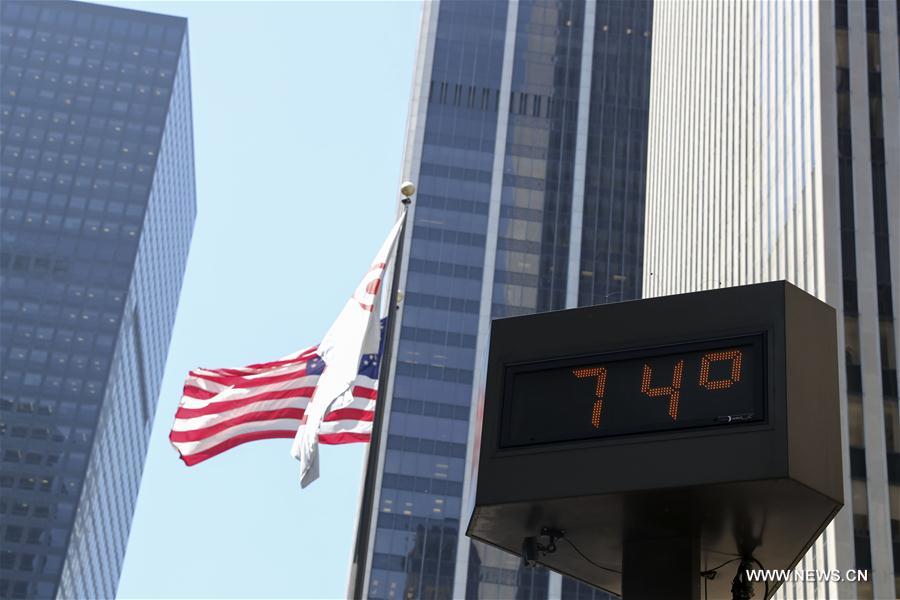
A screen shows the outdoor temperature in Manhattan, New York City, the United States, on June 1, 2017. U.S. President Donald Trump announced U.S. withdrawal from Paris Agreement on climate change on Thursday. (Xinhua/Wang Ying)
by Xinhua writer Wang Haiqing
BEIJING, June 2 (Xinhua) -- After more than a week of anticipation, the world finally received U.S. President Donald Trump's decision about his country's future role in the 2015 Paris accord on climate change, and that is, to the regret of almost all, to cut itself loose from the historic global agreement that the country once played a key role in making.
For most of people following the matter, Trump's announcement is anything but a surprise.
Trump has been blunt about his doubt of climate change, calling it hoax during the election campaign. He also pledged on the campaign trail to cancel the Paris deal and rescind various climate policies by the Obama administration, action he has already taken, citing the need to resurrect the flagging coal industry so as to create more jobs in the U.S. heartland.
In the lead up to his final decision regarding the U.S. role in what is so far the most comprehensive global pact to fight climate change, the U.S. leader said he has had extensive discussions with people either supporting or opposing to the idea of Washington's withdrawal.
As a result, one can only assume that Trump has very good reasons to leave the Paris agreement, and that he knows the implications of U.S. retreat from the landmark deal, signed by more than 190 countries and representing a common aspiration of mankind for a low-carbon future.
But it is still worth mentioning that leaving the Paris deal and easing efforts to control emissions would hardly translate into a substantial increase in new jobs since the fossil fuel industries are highly automated and are unlikely to employ more workers, as more than many experts have pointed out.
It may take time for the U.S. president to find out if there's any truth in these experts' conclusion about the relevance between U.S. jobs and the Paris deal, but he has already faced criticism from some key allies.
All the other G7 members were at least disappointed, if not enraged, that Trump refused to reaffirm continuing U.S. support for the Paris deal at the G7 summit in Sicily, Italy, last week.
Their divergence on climate change may turn out to be another drag on trans-Atlantic relations, on top of Trump's support for Brexit, and his position on NATO defense expenses.
The United States had promised to slash emissions by 26-28 percent below 2005 levels by 2025. According to an analysis from the think tank Climate Interactive, the U.S. pledges would account for 21 percent of the total expected emissions cuts out to the year 2030 under the Paris agreement.
Trump's decision to ditch the Paris deal will leave a fairly big shoe for a single country to fill, but other major players including the European Union, China and India have reiterated their willingness to step up efforts in the face of the U.S. change of heart over the landmark deal.
The U.S. fiasco regarding the Kyoto Protocol 16 years ago has taught us the hard way, and the world knows only too well that, with or without the U.S. playing a leading role, they will have to honor their pledges under the Paris deal and work even harder to cut carbon emissions so as to secure a better future for the planet.
And as UN Secretary General Antonio Guterres has said, if any government doubts the global will of the accord, then the world must be united more than ever to stay the course.















